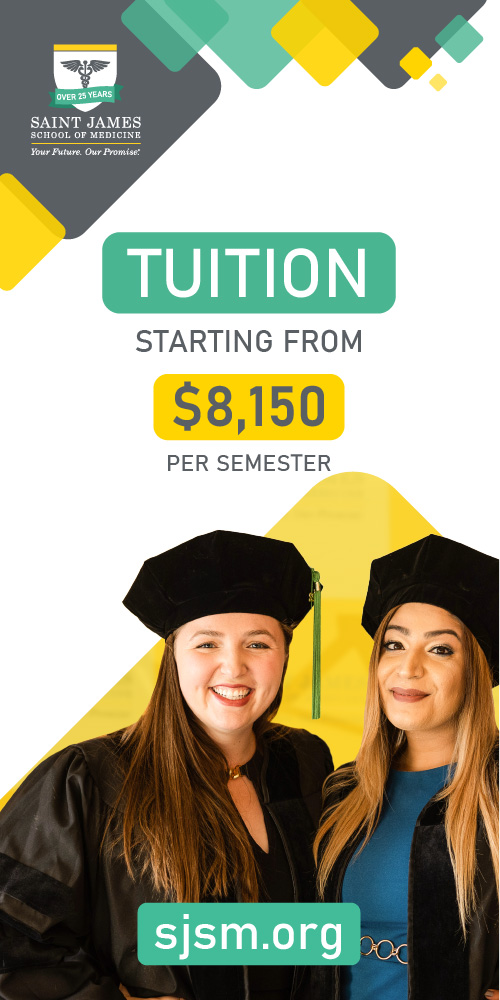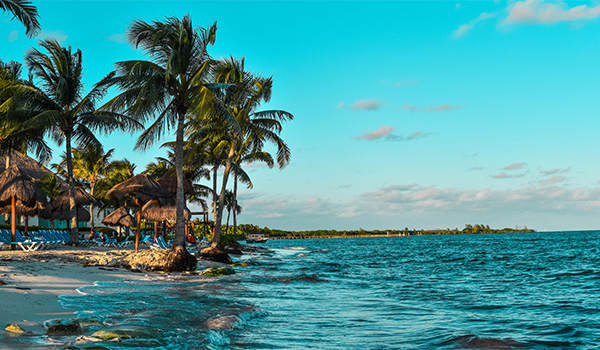Students can enter School on two different tracks depending on their educational background.
Basic and Clinical Sciences
As discussed in the Basics, the MD program is usually comprised of 10-11 semesters split into two distinct components:
- Basic Sciences (usually the first 4-5 semesters completed on the island where the school is located)
- Clinical Sciences, which are comprised of 72-96 weeks of rotations in the hospitals affiliated with the school.
Basic Sciences
The Basic Sciences are completed on the island on which the school is located. Basic Sciences are usually comprised of the classroom study of the topics such as Anatomy, Pathology, Physiology, Histology, Pharmacology, and others. The Basic Sciences are comprised of 4-5 semesters, each usually lasting 15-16 weeks each. The last semester of the Basic Sciences, or sometimes the first semester of the Clinical Sciences, is usually called the transitional semester. This is where all the Basic Sciences topics come together in the form of an intensive review for the USMLE Step 1. While this is a typical structure of the program, some schools may have slightly different variations of the same. Basic Sciences are the most important part of your education. This is where you should get all the education you need to pass the USMLE Step 1 on the first attempt. This is also where most of the students drop out of medical school. To properly assess which school offers the best Basic Science program and facilities, please use the tips found throughout the website.

Tip #24: Medical school facilities are NOT created equal.
It is important to know your own requirements of the campus. Some students prefer to study at the library after hours and at night. Other students need public transportation. Some students will not have a laptop or a printer and need access to these facilities on campus. It may sound strange, but some schools do not have some of these facilities, while other charge to use them. We suggest you create a checklist of items that are important to you and try verify the availability of these facilities on campus. You could also talk to a student or an alumn to see how they coped with the potential lack of some of these facilities.

Tip #25: Academic support services, such as tutoring, academic counseling, and faculty office hours are expected to be available at every medical school. Make sure that the school you are considering has these facilities.

Tip #26: Medical School is required to have psychological counseling available for students free of charge.
Some students need help with the adjustment to island life. Other students have difficulties with the workload of the medical program or personal issues while on the island. Although you may think you will never need these services, please make sure the school has them anyways. Many schools will say that their faculty is there to help with these issues, but the accreditation standards of the medical school mandate that these services be provided by an outside party. (Please note that some islands are so small that there may not be a licensed counselor available. As such, a faculty member is the best you are going to get). Because it is an additional financial burden on the school many do not offer this service.

Tip #27: Look up the names of the professors and deans of your program.
The websites of the school generally have the list of faculty available. If not, please ask them to give you the list. Look these people up and see what their qualifications are. Are any of them US-trained? Is there a healthy mix of the MD and PhD faculty? Do they have teaching or medical practice experience? Have they ever thought of a USMLE method? The internet will often tell you more than you expect. Sometimes the results will be surprising!

Tip #28: Visit the campus before committing.
Yes, this is an additional cost in your already stretched budget. However, you are about to embark on a project of a lifetime that will cost you anywhere between $100,000-$300,000 and 4-6 years of your life. A $1,500-$2,000 investment to visit the island and the school should be the least of your concerns. Visiting the campus will answer so many questions. You would be able to speak to students and faculty, island folks, and you would be able to understand and verify everything that was told to you by the admission team. If you are considering multiple schools, this is a great way to evaluate them.
Clinical Sciences
Clinical Sciences are the best part of the medical program. This is where the student spends time in the hospitals with the teaching faculty learning about different aspects of clinical medicine by observing patient interaction. All students must complete 6 CORE rotations, usually totaling 48 weeks:
- Family Medicine - 6 weeks
- Internal Medicine - 12 weeks
- Surgery - 12 weeks
- Pediatrics - 6 weeks
- Psychiatry - 6 weeks
- OBGYN - 6 weeks
The remaining 24-48 weeks are called ELECTIVE rotations and are usually conducted in 4-week increments in the area of a specific subspecialty that the student is looking to pursue. Common elective rotations can be:
- Thoracic Surgery
- Cardiology
- Geriatrics
- Neurology (sometimes referred to as a mandatory elective)
- Plastic Surgery
- Neonatology, etc...
Importance of Teaching Hospitals
Licensing boards of almost any state requires that the core rotations are complete in the US teaching hospitals. Teaching hospitals, also referred to as Green Book or ACGME-approved hospitals, are hospitals that have established teaching and residency programs. In general, the hospital has the ability to teach the core rotation if the hospital has a residency program in that specialty. For example, you should take an Internal Medicine core rotation in a hospital that has a residency and teaching program in OBGYN and Pediatrics. Many states will accept all six core rotations if they are completed in a hospital that only has a Family Medicine residency program.

TIP #29: All medical schools should list the teaching sites they are affiliated with on their website. If not, ask the school to provide you with the list. Verify that the school is truly affiliated with the teaching hospitals.
Obtaining an affiliation with a teaching hospital in the United States is extremely difficult for Caribbean Medical Schools. It is even more difficult if the school is not accredited. Teaching hospitals are very cautious about affiliating with those schools. If necessary, contact the hospital and or ask the school to put you in touch with the student who is rotating there. If the hospital is nearby, check them out and ask if the students of this school are there in rotation.

Tip #30: Verify that the affiliated hospitals teaching programs are actually ACGME approved.
>>> Click here for the ACGME search engine to see the list of ACGME approved programs. <<<
USMLE Step 1
USMLE Step 1 is taken after the completion of Basic Sciences and before entering Clinical Sciences. It measures the student’s knowledge obtained in Basic Sciences and the student’s readiness to enter the Clinical Science component of the program. USMLE Step 1 is considered the most difficult of the three exams. For Caribbean medical students, this is the biggest obstacle to completing the program and becoming a successful physician.
USMLE Step 2 (Clinical Knowledge)
USMLE Step 2 is an exam that measures a student’s ability to apply medical knowledge, skills, and understanding of clinical sciences essential for the provision of patient care under supervision and includes emphasis on health promotion and disease prevention. Performance on the USMLE Step 2 CK (passing on the first attempt and with a high score) is very important when applying for residency. According to the National Residency Matching Program (The MATCH) 2014 Survey, results on Step 2 CK is the fourth most important factor when deciding whether to invite a candidate for an interview during the residency application process. According to the same survey, 89% of the residency program directors have indicated that they would never or seldom grant an interview to a candidate who has failed the USMLE Step 2CK on their first attempt.

Tip #31: Although ECFMG does not prohibit this, the school should not allow students to start rotations without passing USMLE Step 1 and should also not allow taking any part of USMLE Step 2 without passing USMLE Step 1.
This indicates a lack of structure and policies in the clinical aspect of the program. Accrediting bodies would not look favorably on this, and neither should you. Knowing how important it is to be successful on these exams, the school should not allow you to take them out of sequence. We also came across schools whose policies permitted the student to take the USMLE Step 2 without requiring any rotations!!! That is like asking you to take the exam without allowing you to take the courses to teach the relevant material.
Latest blogs
Ownership Structures LOREM IPSIM DOLOR SIT AMET
See the Questions


